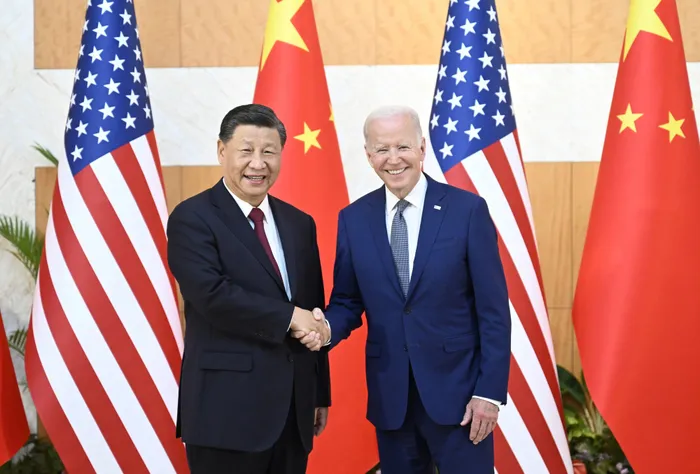US cuts military aid to Egypt, sends money instead to Taiwan

Picture: EPA-EFE/Xinhau/Li Xueren INHUA /LI XUEREN/Taken on November 14, 2022 – Chinese President Xi Jinping, left, greets his US counterpart, Joe Biden, before their meeting, one day ahead of the G20 Summit in Bali, Indonesia, November 14, 2022. Tensions between the two countries over the status of Taiwan has been festering over a long period.
Picture: Reuters – The Egyptian Presidency Egyptian President Abdel Fatah El-Sisi. The Biden administration’s decision to withhold $85 million in aid to Egypt and divert this to Taiwan has been criticised for, on the one hand, being too lenient with Cairo and on the other, being too little to assist Taipei in its mission of self-defence against China’s aggression.
Pictures: Mandel Ngan and Anthony Wallace/AFP – This combination of file pictures created on June 08, 2021, shows US President Joe Biden, left, on June 2, 2021; and Chinese President Xi Jinping on December 18, 2019.
By Karen DeYoung
The Biden administration this week told Congress that it intends to withhold $85 million (about R1.6 billion) designated for US security assistance to Egypt this year, and instead provide the bulk of the money to Taiwan.
The decision brought immediate criticism from legislators that the reprogrammed amount either wasn’t enough to punish Egypt for ongoing detentions of political prisoners and other human rights abuses, or that it was a paltry offering to Taiwan given the urgency of China’s aggressive behaviour.
The decision to redirect $55 million from Egypt to “strengthen Taiwan’s defence capabilities” is the second time in recent weeks the administration has authorised money to Taipei under the Foreign Military Financing programme that previously was reserved for sovereign nations.

In late August, the State Department notified Congress of plans to provide $80 million in the form of aid, rather than sales, of military equipment to Taiwan. China immediately charged it was a violation of US recognition of the “One China” policy and Beijing’s claimed sovereignty over the self-governing island.
Senator Roger Wicker of Mississippi, the top Republican on the Senate Armed Services Committee, said in a statement that the reprogrammed money was “a pittance compared to Taiwan’s enormous needs for self-defence” against the threat from China.
The remaining $30 million in FMF money is slated for Lebanon, according to a notification sent to Congress late Monday. Plans to reallocate the funds to Taiwan and Lebanon were first reported Thursday by the Wall Street Journal.
Wicker also lambasted the administration for taking the money from “a different security partner”, calling it “especially counter-productive since Egypt has proven receptive to this administration’s human rights concerns”.
The United States considers Egypt a crucial partner for Middle East security, and a pillar of regional stability. Both as an incentive, then a reward, for the Camp David Accords that brought peace between Israel and Egypt in 1978, the two countries quickly became the largest recipients of US security assistance. Since then, the United States has provided Egypt with more than $50 billion in military aid and $30 billion in economic assistance, according to the State Department.
Through most of that period, democracy in Egypt has been under constant threat, often disappearing altogether and replaced with harsh military rule, most recently during the tenure of current President Abdel Fatah al-Sisi. As commander of Egypt’s military forces, he led the coup that overthrew the last elected president, Mohamed Morsi, in 2013. In an election the following year, he won the presidency with 97 percent of the vote.
In its State Department appropriations bill last year, Congress directed the administration to hold back $320 million of the $1.3 billion in annual military aid the United States gave Egypt, absent human rights improvements. While the State Department cancelled $130 million in military assistance in 2022, the administration also approved a $2.5 billion arms sales package to Cairo.
In late July, 11 Democratic senators, led by Senator Chris Murphy, D-Conn (Democrat-Connecticut), wrote to Secretary of State Antony Blinken to urge that the full $320 million be withheld this year. “Over the last year, Egypt’s human rights record has continued to deteriorate, despite the Egyptian government’s claims to the contrary,” the letter said.
Al-Sisi’s government has long been accused of abuses against political opponents, the media and others. Over the past year, the senators wrote, “the government has not only failed to investigate allegations of human rights abuses, it has also continued to commit ‘significant human rights’ violations such as extrajudicial killings, enforced disappearance, torture and life-threatening prison conditions, and severe restrictions on freedoms of expressions, assembly and association, as documented in the State Department’s latest human rights report”.
In a Senate floor speech Tuesday, Murphy, who chairs the Senate Foreign Relations Subcommittee on the Near East and sits on the Appropriations Committee, noted that: “Egypt has released more than 1,600 political prisoners since early 2022. That’s good news. During that same time, they have jailed 5,000 more.
“That’s not the kind of ‘clear and consistent progress’ in releasing political prisoners that the law requires,” Murphy said while again urging that the entire $320 million covered by the law be withheld.
The State Department and the Pentagon did not immediately respond to questions about the redirected funds.
Karen DeYoung is associate editor and senior national security correspondent for The Post. In more than three decades at the paper, she has served as bureau chief in Latin America and in London and as correspondent covering the White House, US foreign policy and the intelligence community.
This article was first published in The Washington Post